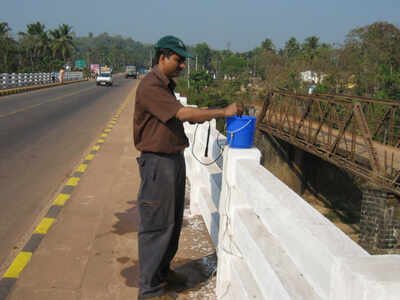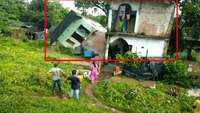
MANGALURU: A new study has revealed that the rivers Netravathi and Swarna, the primary drinking water source for Dakshina Kannada and Udupi districts are found to be containing pharmaceuticals and personal care products (soaps, detergents, creams). Long-term exposure of the pharmaceuticals may affect the aquatic species, said K Balakrishna, professor, Geology, department of Civil Engineering, Manipal Institute of Technology, MAHE.
He told TOI that this is the first study to report the occurrence of antibiotics such as trimethoprim, sulfamethoxazole, chloramphenicol and ceftriaxone and anti-inflammatory drug naproxen in Nethravati and Swarna rivers. The presence of pharmaceuticals was higher in river Netravathi when compared to river Swarna and their concentrations were higher during the summer because of the low water discharge in the river.
“Pharmaceuticals present below 100 nanograms per liter, are believed to be of no human health risk. However, their impact on bacterial populations, especially related to the development of antibiotic resistance due to selective pressure, is a concern,” the paper stated.
Though the samples for this study were collected eight years ago, the team has been analyzing the samples regularly. “Last year, samples collected from the river Gurupur revealed the presence of anti-inflammatory drugs and antibiotics. This report is yet to be published. The source could be from sewage treatment plants, poultry waste, aquaculture, and agricultural effluents, hospital waste, and direct discharge of wastewater into the rivers. Several small towns lack the underground drainage system,” said Balakrishna, the corresponding author of the paper ‘First report of pharmaceuticals and personal care products in two tropical rivers of southwestern India’, published in the Environmental Monitoring and Assessment, an international journal recently.
The team of researchers includes Derrick Ian Joshua, Y. Praveen Kumar Reddy, from MIT, Manipal, V P. Prabhasankar, from Christ College of Engineering, Kerala, A. P. D’Souza, Department of Geography and Environmental Management, Waterloo, Canada, and N. Yamashita, National Institute of Advanced Industrial Science and Technology, Japan.
“It is an ongoing study. Water quality from rivers is monitored constantly. The Board of research in Nuclear Sciences has funded us to suggest a suitable treatment technique to remove these pollutants. We are currently collaborating with scientists from Bhabha Atomic Research Centre to filter wastewater using radiation grafted cotton filters that can possibly remove 100% of the pharmaceuticals. The regulatory bodies like the pollution control board must look into the issue seriously, while the need of the hour is to develop low-cost treatment technology that will protect the water bodies from pollution,” said Balakrishna, adding that similar reports have been recorded from river Yamuna, Ganga, Cauvery and Vrishabhavathi rivers.
He told TOI that this is the first study to report the occurrence of antibiotics such as trimethoprim, sulfamethoxazole, chloramphenicol and ceftriaxone and anti-inflammatory drug naproxen in Nethravati and Swarna rivers. The presence of pharmaceuticals was higher in river Netravathi when compared to river Swarna and their concentrations were higher during the summer because of the low water discharge in the river.
“Pharmaceuticals present below 100 nanograms per liter, are believed to be of no human health risk. However, their impact on bacterial populations, especially related to the development of antibiotic resistance due to selective pressure, is a concern,” the paper stated.
Though the samples for this study were collected eight years ago, the team has been analyzing the samples regularly. “Last year, samples collected from the river Gurupur revealed the presence of anti-inflammatory drugs and antibiotics. This report is yet to be published. The source could be from sewage treatment plants, poultry waste, aquaculture, and agricultural effluents, hospital waste, and direct discharge of wastewater into the rivers. Several small towns lack the underground drainage system,” said Balakrishna, the corresponding author of the paper ‘First report of pharmaceuticals and personal care products in two tropical rivers of southwestern India’, published in the Environmental Monitoring and Assessment, an international journal recently.
The team of researchers includes Derrick Ian Joshua, Y. Praveen Kumar Reddy, from MIT, Manipal, V P. Prabhasankar, from Christ College of Engineering, Kerala, A. P. D’Souza, Department of Geography and Environmental Management, Waterloo, Canada, and N. Yamashita, National Institute of Advanced Industrial Science and Technology, Japan.
“It is an ongoing study. Water quality from rivers is monitored constantly. The Board of research in Nuclear Sciences has funded us to suggest a suitable treatment technique to remove these pollutants. We are currently collaborating with scientists from Bhabha Atomic Research Centre to filter wastewater using radiation grafted cotton filters that can possibly remove 100% of the pharmaceuticals. The regulatory bodies like the pollution control board must look into the issue seriously, while the need of the hour is to develop low-cost treatment technology that will protect the water bodies from pollution,” said Balakrishna, adding that similar reports have been recorded from river Yamuna, Ganga, Cauvery and Vrishabhavathi rivers.
Quick Links
Kerala Coronavirus Helpline NumberHaryana Coronavirus Helpline NumberUP Coronavirus Helpline NumberBareilly NewsBhopal NewsCoronavirus in DelhiCoronavirus in HyderabadCoronavirus in IndiaCoronavirus symptomsCoronavirusRajasthan Coronavirus Helpline NumberAditya ThackerayShiv SenaFire in MumbaiAP Coronavirus Helpline NumberArvind KejriwalJammu Kashmir Coronavirus Helpline NumberSrinagar encounter
Get the app








